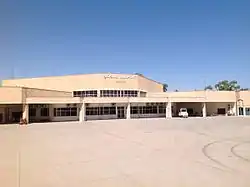Mosul International Airport
Mosul International Airport (IATA: OSM, ICAO: ORBM) is an airport located at Mosul, capital of Nineveh Governorate, Iraq. It became a civil airport in 1990 with the rebuild of the runway (from asphalt to concrete) and construction of a new terminal. After undergoing major renovations to be able to reach international standards and category 1 status, it reopened as a civilian airport on 2 December 2007. On 9 June 2014, it was captured by militants from ISIL.[1]
Mosul International Airport | |||||||||||
|---|---|---|---|---|---|---|---|---|---|---|---|
 | |||||||||||
| Summary | |||||||||||
| Airport type | Public / Military | ||||||||||
| Owner | Government of Iraq | ||||||||||
| Location | Mosul | ||||||||||
| Elevation AMSL | 719 ft / 216 m | ||||||||||
| Coordinates | 36°18′21″N 43°08′51″E | ||||||||||
| Map | |||||||||||
 OSM Location of airport in Mosul | |||||||||||
| Runways | |||||||||||
| |||||||||||
In February 2017, the Iraqi government recaptured the airport from the ISIL militants.[2] It took Iraqi forces just 4 hours to battle the retreating ISIL opponent and clear them off the airport. The retaking of the airport was part of an offensive, that started on 19 February 2017 to retake Western Mosul from ISIL.
History
The airfield was used by the British Royal Air Force (RAF) at the end of the Mesopotamian Campaign of World War I and from 1920 RAF aircraft squadrons (and from 1922 also Royal Air Force armoured car companies) were based there while Iraq was under the League of Nations British Mandate.[3][4] RAF Mosul was handed over to the Royal Iraqi Air Force in 1936 under the terms of the 1931 Mandate but was used again by the RAF during World War II.[3] It subsequently became a major Iraqi Air Force base, with at least a squadron of MiG-21s stationed there.
The military airfield was one of several Iraqi Air Force airfields in the mid-1970s which were rebuilt under project "Super-Base" in response to the experiences from Arab-Israeli wars in 1967 and 1973.
It was seized by Coalition forces in 2003 after Operation Iraqi Freedom. It became a United States Army facility. The 101st Airborne was the first Army Unit to occupy the base in 2003. The Base was divided into two FOB's. FOB Marez to the West and FOB Diamondback to the East which incorporated the Airfield.
On 21 December 2004, fourteen US soldiers, four American employees of Halliburton, and four Iraqi soldiers were killed in a suicide attack on a dining hall at the Forward Operating Base (FOB) Marez, west of the main US military airfield at Mosul. The Pentagon reported that 72 other personnel were injured in the attack carried out by a suicide bomber wearing an explosive vest and the uniform of the Iraqi security services. The Islamic terrorist group Army of Ansar al-Sunna (partly evolved from Ansar al-Islam) declared responsibility for the attack in an Internet statement.
During 2006-2007, the U.S. government spent millions of dollars (15+) restoring the airfield lighting, generators, and built a new air traffic control tower on the East side of the Field. At this time, the Airfield was under the control of the 82nd Airborne (1/17th CAV) which fell under the 25th Aviation Brigade which was based at Camp Speicher/COB-FOB Speicher (Al Sahra Airfield.) The FARP or refueling point was located at the Southeast end of the airfield.
In 2007, during the "so-called" surge the base was downsized and consolidated into one FOB even though the footprint did not change. The name FOB Marez remained and the name of FOB Diamondback went away. Many of the extra CHU's and other types of portable structures were sent to Baghdad to accommodate the surge that was occurring in that area.
The former Iraqi Passenger Terminal was also restored and reopened for a flight in December 2007. The Passenger Terminal was at the far Southwest corner of the airfield. The flight was for The Hajj. Iraqi Airlines flew 152 passengers to Baghdad which was the first commercial flight since U.S. Forces declared the no fly zone in 1993.
In 2011, the airfield and facility were turned back over to the Iraqi Government.
On 9 June 2014, the airport was captured by militants from the Islamic State of Iraq and the Levant as part of the 2014 Northern Iraq offensive.[1] Satellite images taken on 31 October 2016 shows that the airport runways have been damaged, with wide trenches carved into them and rubble placed along their lengths, according to Stratfor. Taxiways and aprons have also been sabotaged by ISIL militants.[5] The airport was retaken by the Iraqi government in an effort spearheaded by the Federal Police on 23 February 2017.[6][7]
Airlines and destinations
Currently, there is no air service to Mosul.
References
- Warwick, Nigel W. M. (2014). IN EVERY PLACE: The RAF Armoured Cars in the Middle East 1921-1953. Rushden, Northamptonshire, England: Forces & Corporate Publishing Ltd. p. 664. ISBN 978-0-9574725-2-5.
- Jefford, C.G. RAF Squadrons, a Comprehensive Record of the Movement and Equipment of all RAF Squadrons and their Antecedents since 1912. Shrewsbury: Airlife Publishing, 2001. ISBN 1-84037-141-2.
- Sly, Liz; Ramadan, Ahmed (10 June 2014). "Insurgents seize Iraqi city of Mosul as troops flee". The Washington Post. Retrieved 10 June 2014.
- Alkashali, Hamdi; Formanek, Ingrid; McKirdy, Euan; Dewan, Angela. "Iraqi forces retake Mosul airport". CNN. Retrieved 2017-02-23.
- Jefford, RAF Squadrons
- Warwick, In Every Place
- "Mosul: Satellite images reveal IS airport destruction". 10 November 2016.
- Callimachi, Rukmini; Gordon, Michael R. (2017-02-22). "Most of Mosul Airport Is Taken by Iraqi Forces in Push Against ISIS". The New York Times. Retrieved 2018-02-07.
- "Iraqi forces take control of Mosul Airport". Al Jazeera. 2017-02-23. Retrieved 2018-02-07.
External links
- Mosul International Airport at Global Security
- Mosul International Airport receives $10.3 million for upgrades
- Airport information for ORBM at World Aero Data. Data current as of October 2006.